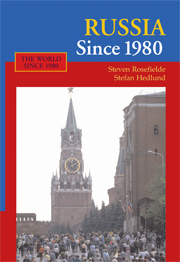Book contents
- Frontmatter
- Contents
- List of Figures, Tables, and Boxes
- Acronyms
- Timeline
- Preface
- Acknowledgments
- Introduction
- PART I RUSSIA BEFORE 1980
- PART II GORBACHEV
- PART III YELTSIN
- PART IV PUTIN
- PART V ADVANCE AND RETREAT
- 10 Semblance of Democracy
- 11 Social Change and Adaptation
- 12 International Relations
- PART VI PROSPECTS
- Conclusion
- Glossary
- Bibliography
- Index
- References
10 - Semblance of Democracy
Published online by Cambridge University Press: 05 June 2012
- Frontmatter
- Contents
- List of Figures, Tables, and Boxes
- Acronyms
- Timeline
- Preface
- Acknowledgments
- Introduction
- PART I RUSSIA BEFORE 1980
- PART II GORBACHEV
- PART III YELTSIN
- PART IV PUTIN
- PART V ADVANCE AND RETREAT
- 10 Semblance of Democracy
- 11 Social Change and Adaptation
- 12 International Relations
- PART VI PROSPECTS
- Conclusion
- Glossary
- Bibliography
- Index
- References
Summary
The concept of democracy always seems to have befuddled the Russians. Vladimir Lenin famously declared that the dictatorship of the proletariat was a million times more democratic than western parliamentary democracy, unfazed by the fact that a dictatorship cannot be democratic. The sentiment was echoed in Joseph Stalin's 1936 and Leonid Brezhnev's 1977 constitutions both of which banned political opposition to Communist Party rule. Circa 1980, democracy for the Kremlin meant Communist Party balloting to determine some policy matters or more often to demonstrate unanimous support for decisions made by senior officials. Important policies were imposed from above by a small coterie, often by the general secretary of the Communist Party or by consensus of the inner party group. Broader party consensus or pluralities sometimes governed lesser decisions, but in no case could it be said that the enlightened will of the people, directly or through freely chosen representatives, ruled. Soviet power was autocratic, not democratic, despite persistent claims to the contrary.
Mikhail Gorbachev's call for demokratizatsia (democratization) should be construed from this perspective as an effort to devolve greater policymaking authority to the lower ranks of the party and encourage broader public participation in Communist Party campaigns rather than as an assault on Soviet autocracy. He was unperturbed by the possibility that shrewd politicians might co-opt his initiative for other ends like destroying the Soviet Union or, even less plausibly, establishing popular sovereignty.
- Type
- Chapter
- Information
- Russia Since 1980 , pp. 169 - 187Publisher: Cambridge University PressPrint publication year: 2008

